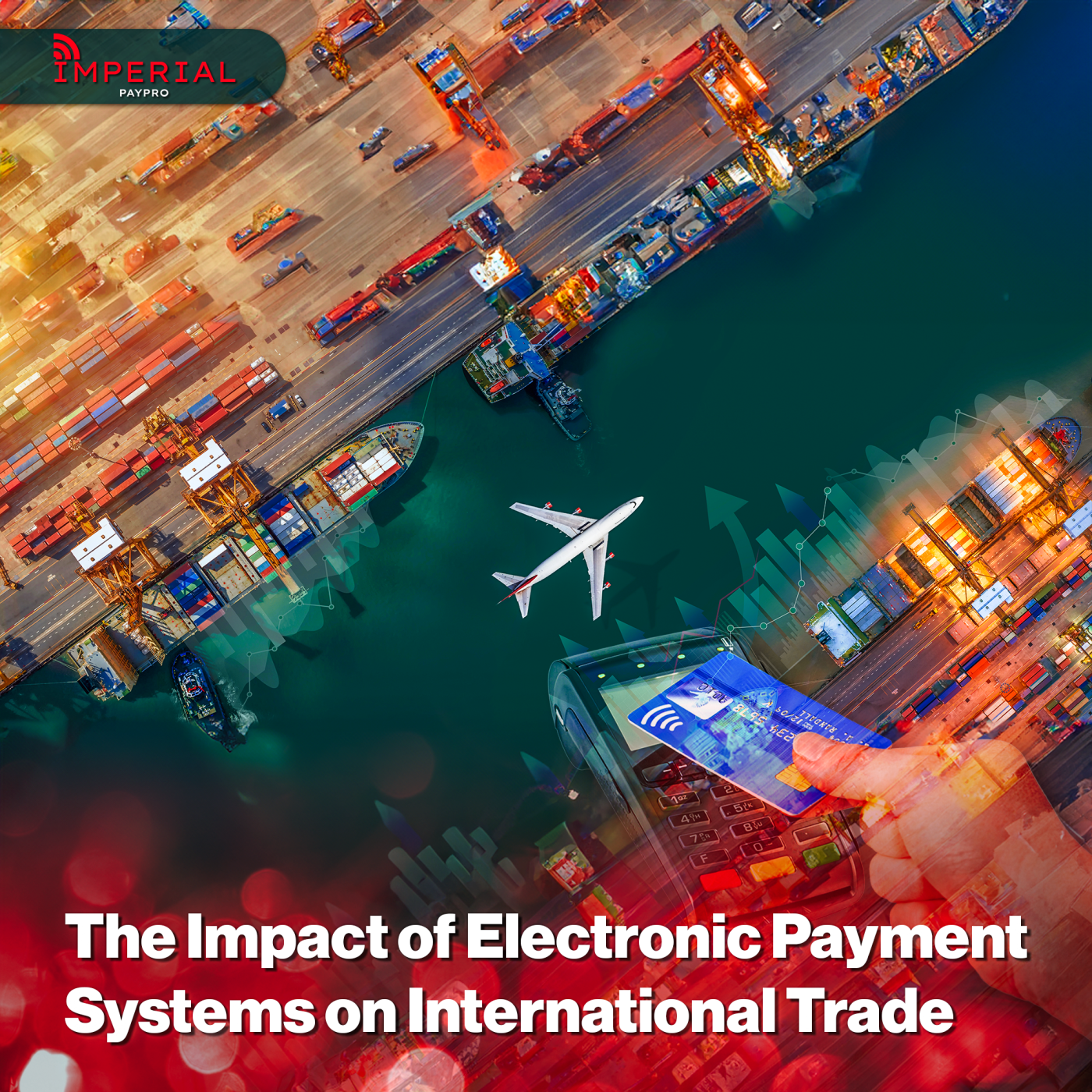The Impact of Electronic Payment Systems on International Trade

In this fast-paced digital age, having a fast and secure payment system is extremely important. This applies to international trade, as well. The dynamics of international trade are continually changing and advancing. The prime reason for this is the incorporation of electronic payment systems. This blog discusses the many advantages of using electronic payment methods in international trade. It will glance at how electronic payment systems result in speedier transactions at lower costs.

The Evolution of Electronic Payment Systems
In the early days of trade, merchants relied on carrier pigeons and letters of credit. Today, advanced electronic payment systems have revolutionized the way we conduct business. This technological advancement showcases human ingenuity and a longstanding proclivity for efficiency and security.
The general equilibrium methodology and recent technological breakthroughs have underscored the critical role of electronic payment systems in facilitating international trade. The financial community now recognizes their indispensable nature in today’s globalized economy.
Technological leaps, especially in payment security, have completely altered the commercial world. It has introduced faster, safer and more reliable ways to make financial transactions. There has been explosive growth in credit cards and online transactions. Electronic payment methods have surpassed traditional trade methods and reached new heights.
Advantages of Using Electronic Payment Systems
Using electronic payment systems offer a lot of advantages. These advantages are unmatched by traditional paper-based systems. The adoption of electronic funds transfer (EFT) systems have mitigated many economic imperfections, leading to a faster and cost-effective economic environment.
Following are the main advantages of electronic payment systems:
Reduced Transaction Costs: With an electronic payment system, you do not need physical documents. This reduces the overall cost of trade transactions.
Increased Efficiency: Electronic payment systems offer instant processing of payments. This speeds up payment cycles, enhancing the fluidity of business operations.
Enhanced Security: With technological advancements, the security aspect of electronic payments have also improved. The risk of fraudulent activities and unauthorized transactions have reduced.
Global Reach: Electronic payments have no borders or physical restrictions. Businesses can smoothly participate in global trade. This presents businesses with the opportunity to widen their market beyond their own country.

Another Advantage: Financial Literacy
Another huge advantage of electronic payment systems is that when you practice smart banking, it significantly enhances your financial literacy. This is especially true in the context of international trade. Using electronic payment systems, provide real-time insights into your spending habits and cash flow management. By engaging with these systems, you gain a deeper understanding of transaction processes, currency exchanges, and the impact of fees on international transactions. This hands-on experience not only improves your ability to manage personal finances but also equips you with the knowledge to navigate complex financial landscapes effectively.
Moreover, smart banking practices often come with educational resources and tools designed to boost financial literacy. Many banks offer tutorials, webinars, and personalized advice on how to optimize the use of electronic payment systems for international trade. These resources help demystify financial jargon and concepts, making it easier for individuals to make informed decisions. As you become more familiar with these systems, you develop a keen sense of financial acumen, which is crucial for both personal and professional growth in today’s global economy.
By actively engaging with electronic payment systems and smart banking, you not only streamline your financial transactions but also cultivate a proactive approach to financial education. This proactive stance is essential for staying competitive in an increasingly digital world, where understanding the nuances of electronic payments can lead to better financial outcomes. As you continue to engage with these systems, your financial literacy will naturally expand, empowering you to make strategic decisions that align with your long-term financial goals.
Future Innovations in Electronic Payments
The evolution in technology is continuous and there are predictions as to what the electronic payment systems will evolve into in the future. As advancements continue and we increasingly adapt to smart banking, it is predicted that speed, security and accessibility of electronic payments will continue to improve. Consider the integration of block chain technology and artificial intelligence. It will take security and speed of electronic payments to unparalleled heights, revolutionizing the way businesses function in digital markets.
The Role of Policy and Standards
While there are a lot of advantages, there are also a lot of challenges to effectively executing an electronic payment system. One of them is the requirement for robust regulatory frameworks and international standards. Without these metrics, electronic payments are not as secure, transparent and reliable across jurisdictions, as they are within.
Overcoming Challenges in the Digital Payment Landscape
As electronic payments are becoming more common and important, the risks involved with them are also rising. Cybersecurity threats and fraudulent activities are growing. It is critical that we effectively manage these risks to ensure that electronic payment systems continue to grow and advance.
It is important to establish and maintain liquidity in the electronic money sector. In other words, there should always be enough electronic money available for people to use and exchange. Without availability of sufficient funds, the system may get disrupted or even fail.
Secondly, there should be strict regulations and standards to prevent failures by providers of electronic money. These regulations would help to ensure that these providers are operating in a safe and responsible manner. This could include requirements related to capital reserves, risk management, and consumer protection
A Real-World Solution: Imperial Pay Pro
If you are a business, looking to adopt electronic payments for secure and efficient financial transactions, Imperial Pay Pro is a great solution. Imperial Pay Pro, stands out as one of the leading payment processing ISOs. We are helping businesses pilot this digital transformation smoothly.
Imperial Pay Pro offers advanced payment processing solutions that meet the needs of modern businesses of different types. Choose Imperial Pay Pro because:
Imperial Pay Pro employs the most sophisticated technology to ensure safe transactions. We are committed to protecting our clients from fraudulent activities and unauthorized access.
Imperial Pay Pro offers fast and reliable payment processing so that businesses can carry their operations without interruptions. Boost efficiency and customer satisfaction by opting for our payment processing solutions.
Imperial Pay Pro offers exceptional customer support. Our dedicated team is always available to help our clients navigate the complexities of electronic payments and smart banking. This facilitates smooth operations.
Conclusion
The integration of electronic payments in international trade will continue to rise in the future. Technological advancements will pave the way for this continuation, leading to a demand for more efficient and secure transaction methods. The benefits and challenges associated with electronic payments underscores the need for continuous innovation and robust regulatory frameworks.
In this dynamic digital landscape, Imperial Pay Pro helps businesses leverage the power of electronic payments. We ensure our clients stay ahead of the curve in the marketplace.
To remain competitive, businesses must fully adopt electronic payment systems. It is not an option, but a necessity. For a smooth transition, partner with Imperial Pay Pro and reap the benefits of efficient and secure financial transactions.
References
For further reading and detailed insights, refer to the paper:
DR. DEMA MATROUK ALOUN, THE IMPACT OF ELECTRONIC PAYMENT ON TRADE,
INTERNATIONAL JOURNAL ON CYBERSPACE LAW AND POLICY, 2 (1) OF 2024, PG. 01-11, APIS – 3920-0012 |
ISSN – 2583-7990
